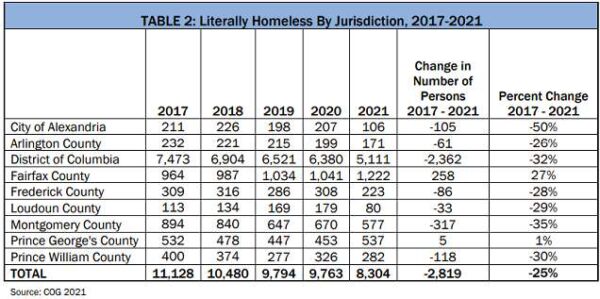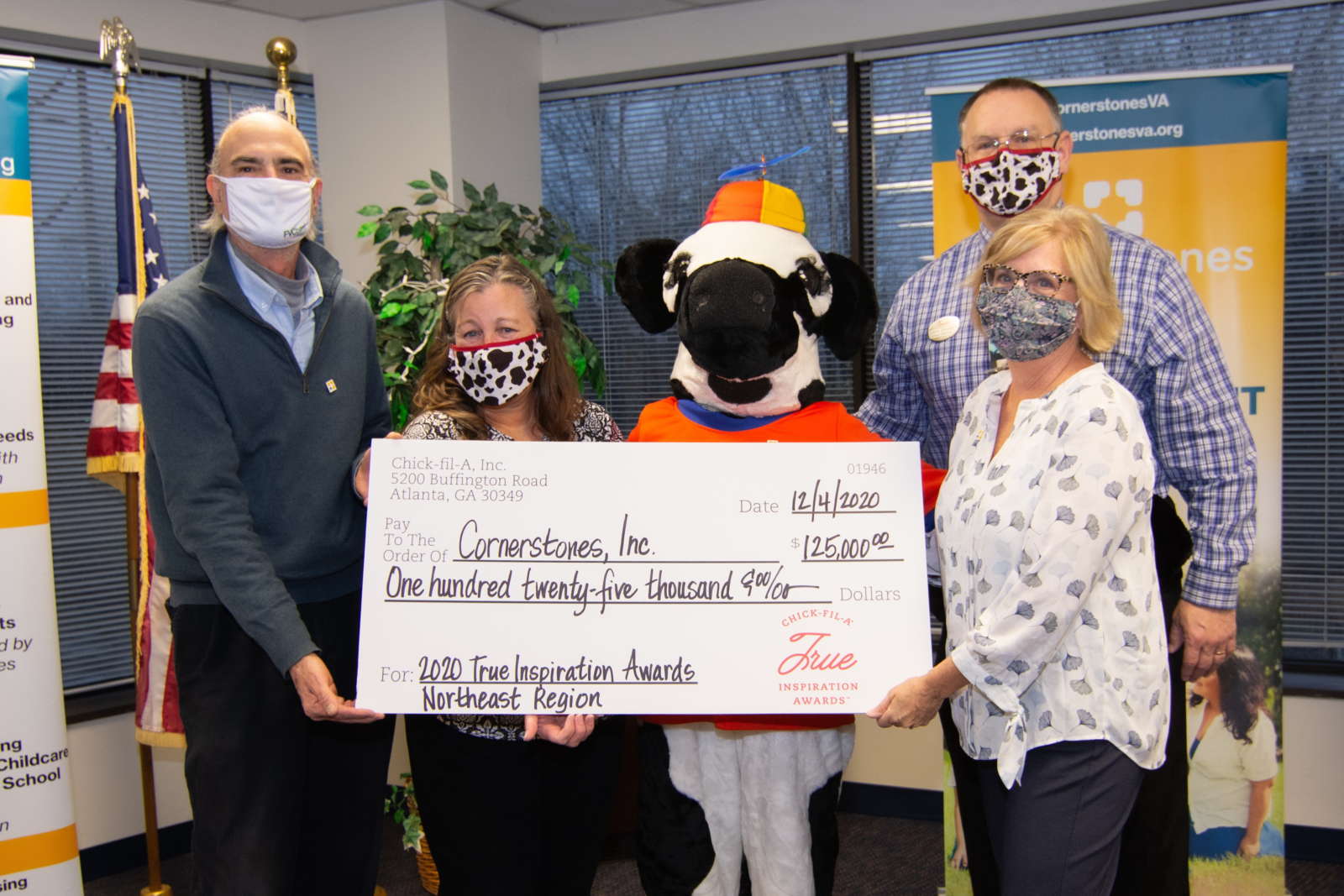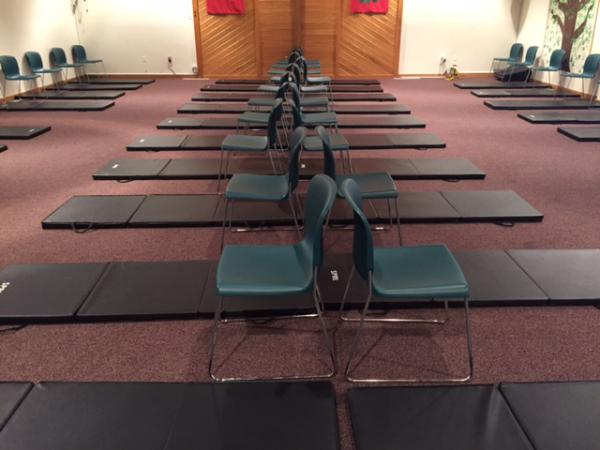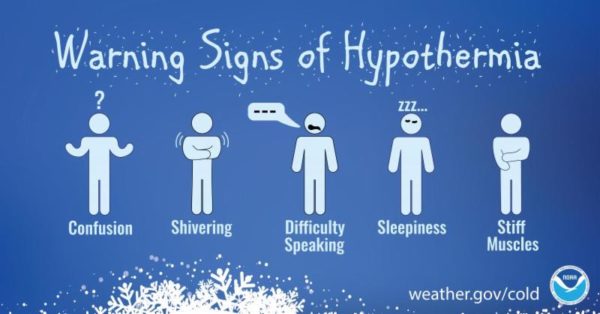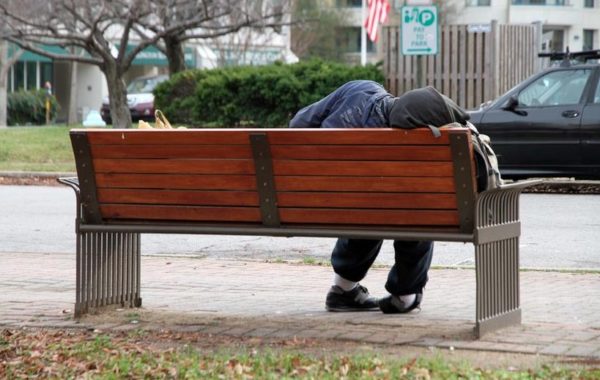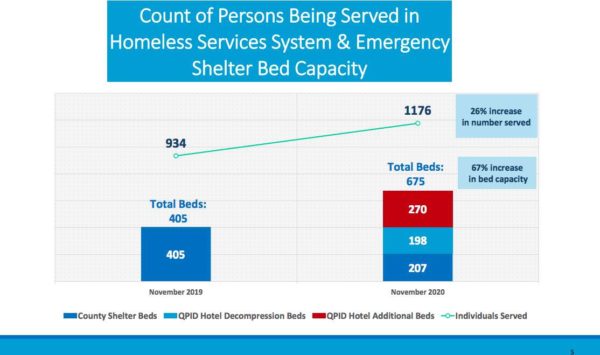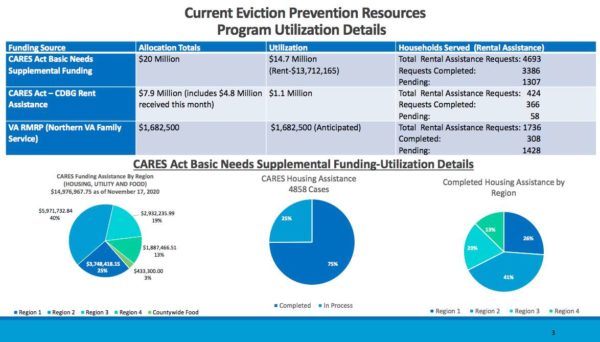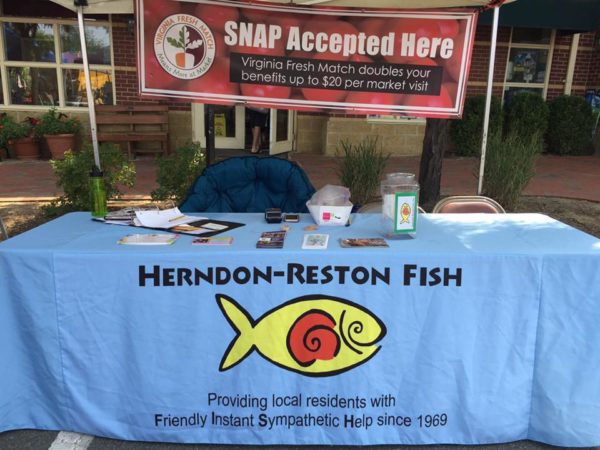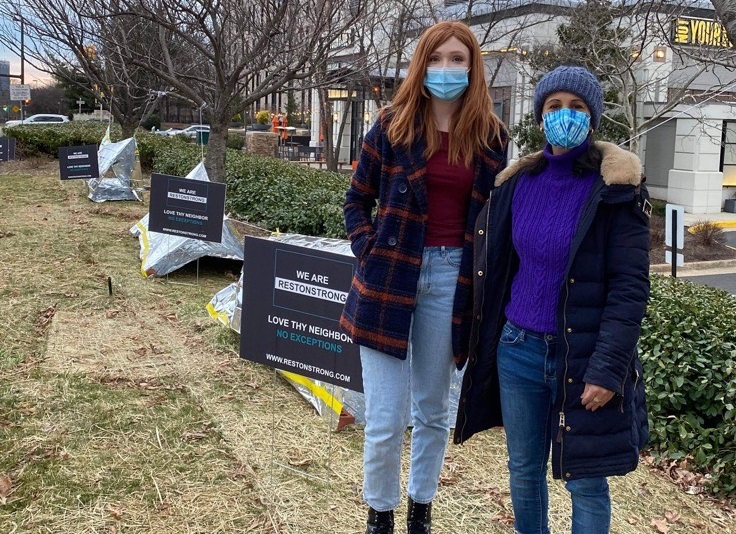
A local effort to help homeless people in Reston is taking another step: looking to Fairfax County for relief.
The community group Reston Strong plans to ask county supervisors to change zoning rules to make it easier for temporary transitional housing in commercial buildings and spaces by making those adaptations “by right,” meaning a property owner wouldn’t need extra approvals if a project is within certain areas.
The 2,000-member group originated from a donation drive from Sarah Selvaraj-D’Souza, who noted in a statement how several buildings have been empty and felt that the change would be the cheapest and easiest solution to help get people indoors this time of year. Among its efforts, the county since 2005 has worked to provide hypothermia shelters during the winter.
Advocates are also looking for the county to pilot a mobile mental health crisis unit. Selvaraj-D’Souza stated that Reston Strong helped a woman while she was experiencing a mental health emergency a few months ago after police found her in the snow without a jacket. She had lost her bearings, and the group placed her in a hotel.
In addition, Reston Strong wants the county and Inova to consider a housing feasibility study for the former Cameron Glen rehab facility that closed in 2014.
The county already assists and coordinates with other groups to help those experiencing homelessness through its Office to Prevent and End Homelessness, and it recently revived efforts to pair mental health crisis specialists with specially trained police officers for certain 911 calls.
Last weekend, Reston Strong staged reflective emergency tents the Reston Parkway to raise awareness of about homelessness. Signs said “Love thy neighbor; no exceptions.”
“By showcasing tents along Reston Parkway we brought visibility for one night to our unhoused neighbors sleeping in outdoor tents during the cold winter,” volunteer coordinator Mary Barthelson said in a statement.
The group is looking to submit its concerns to the county board in March.
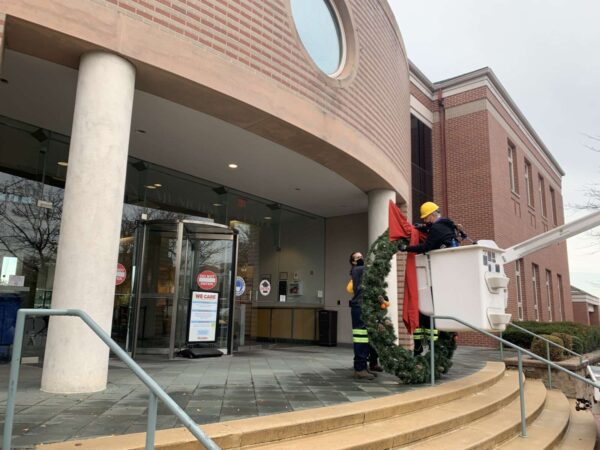
Park Authority Snags Honors — The Fairfax County Park Authority won three GIS excellence awards during the county’s annual Geographic Information System Day contest. The park authority was one of 19 government agencies competing. [Fairfax County Government]
Local Holiday Celebrations Begin in Reston Town Center — The annual Reston Holiday Parade returned in late November to Reston Town Center. The Connection provides an update on the festivities, including comments from one of the emcees, Angie Goff, a news anchor at FOX 5. [The Connection]
County Hypothermia Program Now Open — The county’s hypothermia prevention program is open through March 31. Shelters are available for individual adults and adults with children at several locations across the county. [Fairfax County Government]
Photo by David Taube
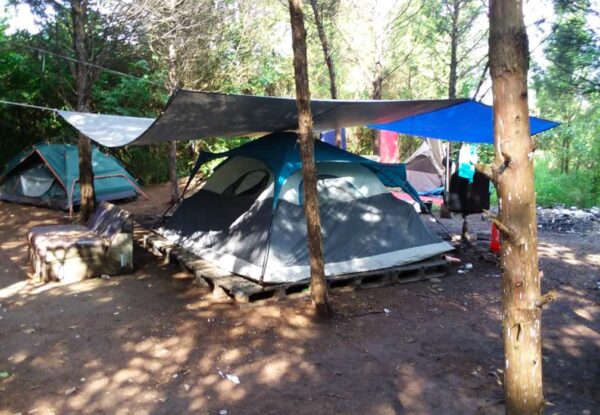
Thanks to federal relief funding, Fairfax County is getting an infusion of emergency housing voucher money to help people who are at risk of homelessness or fleeing from domestic violence and others in need.
The American Rescue Plan Act signed into law in March is providing $10 billion to address homelessness, including 70,000 vouchers to local housing authorities, including Fairfax County.
The county will partner with community groups to provide the housing assistance, which could last 10 years — the length of the program — for each recipient.
“We are very grateful to receive these Emergency Housing Vouchers to serve many of our most vulnerable residents and neighbors and help them achieve safe and stable housing,” Fairfax County Redevelopment and Housing Authority Chair C. Melissa McKenna, who serves as the Dranesville District commissioner, said in a statement.
The Fairfax County Redevelopment and Housing Authority approved a county framework last Thursday (July 15) to receive the money, which involves 169 vouchers that will be made available in coming weeks.
Recipients will need to be referred to the program by county case managers or other service points, such as homeless services, Coordinated Services Planning (703-222-0880), or the Domestic and Sexual Violence 24-Hour Hotline (703-360-7273).
Money will go to landlords, and recipients will be required to pay 30% of their income toward rent and utilities.
The emergency housing vouchers can cover a variety of costs, including security deposits, moving expenses, and essential household items such as bedding and tableware.
Even outside the vouchers, ARPA has dedicated billions of dollars to addressing housing issues, as people have struggled to pay rent amid statewide shutdowns last year and uncertain employment due to the COVID-19 pandemic.
The need to provide housing assistance is expected to become especially urgent in the coming months after the Centers for Disease Control and Prevention’s eviction moratorium expires on July 31.
“The [assistance is] designed to prevent and respond to [the] coronavirus by facilitation the leasing of the [emergency housing vouchers], which will provide vulnerable individuals and families a much safer housing environment to minimize the risk of coronavirus exposure or spread,” Dominique Blom, a general deputy assistant secretary with the Housing and Urban Development Department, said in a May memo describing the funding.
Vaccinations have helped bring the virus under control, but cases have been rising in Virginia and the U.S. amid the spread of the highly contagious delta variant, which is now the source of 83% of all new COVID-19 cases, according to CDC estimates.
“Individuals and families who are homeless or at-risk of homelessness are often living in conditions that significantly increase the risk of exposure to coronavirus in addition to other health risks,” Blom said in the memo.
Eligibility for the vouchers is limited to individuals and families who are experiencing homelessness, at risk of homelessness, or were recently homeless and “for whom providing rental assistance will prevent the family’s homelessness or having high risk of housing instability.”
People fleeing — or attempting to flee — domestic violence, dating violence, sexual assault, stalking, or human trafficking are also eligible for the vouchers.
“These vouchers — in addition to the existing programs and services offered through a robust partnership — offer yet another valuable resource to help position individuals and families on a reliable foundation from which they can achieve their fullest potential,” McKenna said in her statement.
During the first year of the pandemic, homelessness decreased throughout the D.C. region except in Fairfax County, which saw a 17% increase from 1,041 people in 2020 to 1,222 in 2021, and Prince George’s County, which had a 19% increase, according to a Metropolitan Washington Council of Governments report.
Fairfax County has attributed the increase to expanded services supported by COVID-19 relief funding.
A new report by the Metropolitan Washington Council of Governments (COG) highlights some remarkable regional success in reducing homelessness. In Fairfax County, the numbers seemed to tell a different story, but county leadership says some of that is a result of the way the survey is conducted.
The annual study sends researchers across regional localities to collect a snapshot of how many residents are experiencing homelessness, and while not a comprehensive scientific count, it’s generally seen as a look at regional trends.
While neighbors like Arlington County and the City of Alexandria reported declines in their homeless population counts by 14% and 49%, respectively, Fairfax County is one of only two out of nine jurisdictions surveyed that saw its homeless count increase.
In Fairfax County, homeless population counts went from 1,041 in 2020 to 1,222 in 2021, a 17% increase. The only other D.C.-area locality to report a year-to-year rise in its homeless population was Prince George’s County, which increased by 19%.
Fairfax County claims on its website that the increase reflects an expansion of shelter capacity and services, rather than an increase in homelessness.
“The increase is primarily attributable to the increase in the community’s capacity to provide shelter with increased federal emergency funding associated with the COVID-19 pandemic, and the commendable efforts of service providers to care for unstably housed community members,” the Fairfax County Office to Prevent and End Homelessness said.
Fairfax County Board of Supervisors Chairman Jeff McKay similarly credited the increase in the count to an increase in accommodations for people experiencing homelessness.
“This year’s data indicates an outstanding effort by our Housing staff and our community-based partners to respond to the unprecedented impacts of 2020,” he said in a statement. “By providing safe housing accommodations and a wide variety of supportive services to assist our most vulnerable neighbors along the path toward housing stability, we have been able to help our entire community.”
However, since at least 2017, the homeless population counts for Fairfax County have been gradually increasing, which McKay says is also indicative of an inadequate affordable housing stock.
Released in two parts across 2018 and 2019, the county’s Communitywide Housing Strategic Plan set a goal of producing a minimum of 5,000 net new affordable housing units within 15 years. 1,800 units are currently in the pipeline, according to McKay.
In his statement on the homelessness point-in-time count data, McKay said:
Most importantly, it indicates that our work on the issue of housing — including emergency housing — must and will continue to be a critical priority for this Board. This is an essential component of our community’s crisis response system for those who need help in regaining a safe, decent and stable housing situation.
Housing is a foundational component in achieving positive outcomes in nearly every aspect of our lives and having thousands of our neighbors experiencing homelessness or struggling to remain in their homes is not something that we as a community will turn a blind eye to. This could be any of us. There are too many circumstances beyond our control which can cause that stability to be shaken through no fault of our own.
Photo via MWCOG
Cornerstones, a Reston-based nonprofit organization that offers housing stability program in Northern Virginia, has won a $125,000 grant award from Chick-fil-A.
The organization was one of 34 national winners selected for Chick-fil-A’s True Inspiration Awards. The grant will support Cornerstones’ homeless prevention, emergency shelter, and housing stability programs, including the Embry Rucker Community Shelter.
Kerrie Wilson, Cornerstones’ CEO, said her team is “incredibly honored” to receive the award.
“The foundation’s investment in our community will amplify our capacity to swift triage people struggling in our community,” she said.
The True Inspiration Awards program was created five years ago to honor the legacy of Chick-fil-A founder S. Truett Cathy. The program supports nonprofit organizations that work in the areas of education, hunger and homelessness.
Larry Schwartz, chairman of Cornerstones’ Board of Directors, said the grant will help support the organization’s wrap-around services and programs “so vulnerable neighbors can rebuild stability and resiliency by securing affordable, long-term housing, provide quality education programs for their children, and obtain valuable living-wage job skills so they can go back to work in our community.”
Cornerstones’ was nominated by Larry Everett, owner and operator of the Chick-fil-A in North Point Village Center.
Photo via Cornerstones
It has barely been 10 days since Fairfax County launched its annual Hypothermia Prevention Program, and it’s already clear that this winter will be unlike any other that Abby Dunner has experienced in her nearly decade-long work with the initiative.
Now the manager of the Fairfax County Office to Prevent and End Homelessness, Dunner has been involved with the hypothermia prevention program since she was employed as a case manager and assistant by the nonprofit FACETS in 2012.
The COVID-19 pandemic, however, forced Dunner and the other county and nonprofit officials who run the program to completely reengineer their operations, which were well-honed after 15 years of providing shelter for people in need during the coldest months of the year.
This year’s hypothermia prevention program, which started on Dec. 1 and runs through Apr. 1, 2021, must contend not only with the public health risks and social distancing protocols created by COVID-19, but also the looming threat of a surge in homelessness if emergency assistance measures end.
“We recognize the challenges and kind of the unique situation that we’re in, but everybody is also very much on board with understanding that the program has to continue,” Dunner said. “We have to still be able to shelter people who are experiencing homelessness.”
County officials and the nonprofit contractors that operate the hypothermia prevention shelters realized early on that they would have to make major changes to the program to make it viable this year.
Dunner says the Office to Prevent and End Homelessness collaborated extensively with the Fairfax County Health Department throughout the planning process. Health officials walked through each site and recommended ways to implement social distancing as much as possible.
Typically, the county relies on faith communities and nonprofits to host the actual shelters, which rotate between different locations every week, but the churches and other buildings usually utilized were too small to allow for the approximately 100 square feet of space sought per guest.
This time, the county turned to its own facilities, ultimately identifying seven sites that were sufficiently spacious, centrally located, and accessible by public transportation.
Dunner says the hypothermia prevention program generally serves about 1,200 people across its four months of operation, and roughly 215 people utilize the shelters each night.
Though only a handful of people stayed at the Container Store site for the first couple of nights, the shelter averaged about 26 guests over the program’s first seven days, reaching 40 people on Dec. 7 with numbers expected to continue rising, according to Dykes.
Individuals are given 100 square-foot spaces marked off by tape, and they are required to wear masks except when eating and sleeping in their space.
Shelter staff, who also must wear face coverings, administer temperature checks and wellness questionnaires when guests arrive. If someone records a high temperature or reports COVID-19 symptoms, they are directed to one of the Quarantine, Protection, Isolation and Decompression sites that Fairfax County has set up in local hotels, where they can be monitored and tested.
As of Dec. 9, the county has 445 rooms at six hotels for QPID shelter. 360 of them are occupied by 477 guests, only seven of whom were not experiencing homelessness upon admission, Fairfax County Health and Human Services reported.
In addition to housing people who are unable to isolate or quarantine safely in their own home, the QPID rooms could serve as overflow shelter if the county’s emergency shelters and hypothermia prevention sites run out of capacity.
FACETS Senior Director of Programs Carole Huell says Fairfax County could also revisit sites that were previously considered for the hypothermia prevention program, but a second location would require hiring more staff, something that was already a challenge.
The volunteers that the program normally relies on to staff the shelters are not involved this year, since they tend to be older and, therefore, at higher risk of contracting COVID-19 if exposed.
“There is a back-up plan [if shelters exceed capacity],” Huell said. “It’s just we hope we don’t have to get to that, because each agency that needs additional space for a facility will have to man that space, and that’s additional resources and funding necessary.”
According to Dunner, Fairfax County is already seeing evidence of the pandemic’s economic fallout, as new people enter an increasingly strained social safety system that had glaring deficiencies even before a deadly contagion entered the picture.
Dunner says the county is “very concerned” about the ripple effects of the U.S. Centers for Disease Control and Prevention’s eviction moratorium ending on Dec. 31, but even with the ban in place, evictions have not wholly stopped.
Still, both county and nonprofit workers believe they have prepared adequately for the season. They have also gotten support from partners in various faith communities, who are contributing food, clothing, and other donations in lieu of being able to serve as hosts and volunteers.
“We’re hoping that, based on the spaces that we’ve chosen and the way that we planned the program, we’ll be able to accommodate anyone who’s in need of shelter,” Dunner said.
Image via Fairfax County Office to Prevent and End Homelessness
About 250 more people are using Fairfax County’s emergency homelessness services this November over last November, and there are enough beds for just over half of them.
That number could increase as the federal ban on evictions draws nearer.
“As we look at potential rising eviction numbers, we need to be aware of the capacity for the homelessness system,” Fairfax County Health, Housing and Human Services Chief Strategist Dean Klein told the Board of Supervisors during a Health and Human Services committee meeting on Tuesday (Nov. 24).
With COVID-19 cases rising, Fairfax County is dealing with increasing numbers of people experiencing homelessness as well as the threat of rising eviction rates. Klein says rent assistance and partnerships with landlords will be critical for preventing evictions and keeping people in homes this winter.
“Our ongoing efforts to reach out to vulnerable populations is increasingly critical,” he said.
One step Fairfax County has taken is to form an eviction prevention task force with representatives from various county agencies, the county sheriff’s office, and the nonprofit law firm Legal Services of Northern Virginia.
Klein says he hopes to receive financial support from the Board of Supervisors next month. His staff anticipates spending at the same level as it is right now, which is about $600,000 a week.
Providence District Supervisor Dalia Palchik said a board matter is in the works that would “give additional local support for our continuation of basic needs, which we know continues to be a concern for us.”
Although funding comes from a number of sources, some are set to run dry soon, adding to the sense of urgency.
The Federal Emergency Management Agency stepped in this year to pay for hotel rooms so that people experiencing homelessness could have a place to sleep safely during the pandemic. However, it is unclear how long FEMA will continue to provide funding, Klein says.
Fairfax County Office to Prevent and End Homelessness Deputy Director Tom Barnett said the FEMA commitments are on a month-to-month basis and will last through the middle of December.
“We will continue to request extensions every month as they will support most of these expenses,” he said.
The U.S. Department of Housing and Urban Development has committed emergency-solutions grant funding to support shelter and rehousing efforts, but those funds “would be quickly used up if FEMA does not continue their support,” Barnett said.
Fairfax County also received more than $30 million in federal and state CARES Act funding and community development block grants to cover basic needs, including rent and mortgage assistance, on top of the $5 million that the county contributed.
“Not only do we need strategies and assistance to move through the end of the year, but we absolutely know this is not ending in 2020,” Palchik said. “Hopefully we will have more state and federal support to address the needs of our community.”
While some social support efforts tackle the challenge of sheltering people during the pandemic, others focus on preventing residents from ending up on the street in the first place.
In August, Klein’s office assigned social workers to 900 people in the legal system who are at-risk for evictions. So far, social workers have helped 300 people. Klein says the likely reason why so many did not respond is that the only way to reach this group of people was by mail.
The office is also beginning outreach to landlords, who might not receive rent payments from third parties. A $150,000 grant from the Kaiser Foundation has gone toward hiring people to work with landlords, but more outreach is needed, Klein says.
On the tenant side, Klein said his office developed guides that explain the current eviction moratorium and help tenants contact the organizations that provide rent payment assistance.
“With the numerous moratoriums, you can imagine how confusing it can be,” Klein said.
Dipti Pidikiti-Smith, the director of advocacy at Legal Services of Northern Virginia, says a number of new provisions protect tenants from being evicted.
Landlords cannot evict tenants unless they provide documentation of what they’re owed and information on available rental assistance programs. Landlords who own five or more units, or have at least 10% interest in five or more units, must offer a payment plan without late fees. Tenants cannot be evicted unless they refuse the plan.
These provisions remain in place through Dec. 31 and will be replaced by similar ones in January, Pidikiti-Smith said.
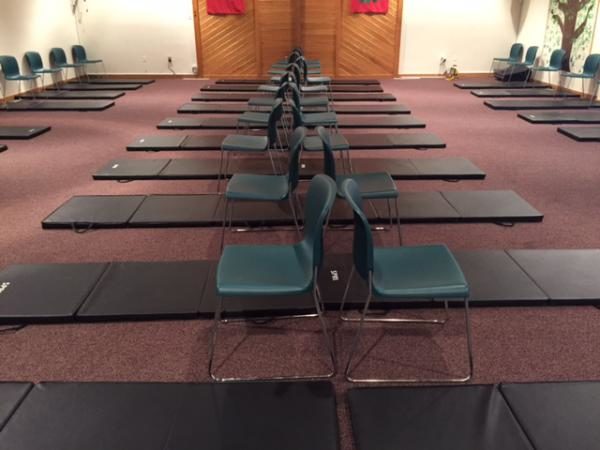
At a Fairfax County Board of Supervisors meeting today (Tuesday), the board will consider an ordinance to approve shelters. The move would also authorize a streamlined process to approve temporary changes in response to the COVID-19 pandemic.
So far, the county has identified four hypothermia shelters, including the North County Human Service building (1850 Cameron Glen Drive). Three other backup locations have been identified in Fairfax.
If approved, the county would be able to set up facilities as a place for transient overnight housing.
The county’s Housing Crisis Response System serves more than 1,000 people who seek shelter from cold every winter. The program operates from November through March.
In previous years, the county has taken support from faith communities. But due to the pandemic, many faith organizations are either unable to take part in the program or can participate with significantly reduced capacity.
The county is anticipating more demand due to the pandemic. The ordinance would also streamline the approval process, which would otherwise be time-consuming and highly individualized.
“The Board of Supervisors has expressed its desire to remove unnecessary obstacles to businesses that seek to stay in business while following state and other governmental COVID-related requirements,” according to meeting materials.
The meeting is set to begin at 2 p.m. today.
Photo via Fairfax County Government
 When Gov. Ralph Northam issued his stay-at-home order in March, Maura Williams, a social worker at a Reston homeless shelter said she knew “this is going to change everything that we’re doing.”
When Gov. Ralph Northam issued his stay-at-home order in March, Maura Williams, a social worker at a Reston homeless shelter said she knew “this is going to change everything that we’re doing.”
Williams, who is the division director for housing and community services for Cornerstones, a non-profit that runs the Embry Rucker Community Shelter on Bowman Towne Drive in Reston, said when the COVID-19 pandemic first hit, staff had to scramble to stay open.
As businesses were closing their offices and sending employees home, Embry Rucker which houses 24 single adults and 11 families, did not have the option to send its residents elsewhere — not without a plan at least.
“The homeless don’t have the option of staying at home,” said Greg White, chief operating officer of Cornerstones. “So I believed that we always have to provide staff to work with our unsheltered and homeless population.”
With much of the country still reeling from the COVID-19 pandemic and the recession it caused, things have remained steady at Embry Rucker, staff said. The demand for their services has remained the same, even with the economic downturn, and staff has found ways to keep the shelter open during the pandemic.
Like many homeless shelters, Embry Rucker has had to implement social distancing measures including housing about half of their residents at a nearby hotel and having some staff work from home. Those who do work at the shelter are required to wear masks.
As is increasingly becoming the norm in many places, the shelter now requires temperature checks for those who enter and has contracted with an outside company to test residents who have symptoms for COVID-19. Residents who test positive, self isolate at a nearby hotel the shelter has partnered with.
Thanks to funding from the federal CARES Act, which Congress passed back in March to give temporary relief to Americans affected by the pandemic, the shelter has used the federal funds to provide rental assistance to those struggling to pay the bills in the pandemic induced recession.
But the ease in which the shelter has handled the pandemic could change quickly Williams said, whenever state and federal eviction moratoriums are lifted and landlords start removing tenants who have not paid their rent. So far, the shelter has seen an increase in its rental assistance program — something that has become a point of emphasis as many people in Fairfax County are out of work and are past due on their rent payments.
The federal funding the shelter received from the CARES Act will only last until the end of the year, a spokesperson for the shelter said, meaning it could become harder to help the ever-growing list of people behind on their rent and mortgage payments.
“I think we are maintaining now. I think we’re holding on, but I think we are all anticipating when the eviction moratorium is discontinued that we are defiantly going to see a very huge housing crisis,” Williams said.

Board OKs Split of Child Care Center Property — “The Fairfax County Board of Supervisors approved a special exception amendment Tuesday, allowing the owner of a piece of property along Centreville Road south of the Town of Herndon to adjust the lot lines of his property. The 2.61-acre property, which is situated east of Centreville Road and south of the West Ox Road intersection, consists of two lots.” [Reston Patch]
Hotel Rooms Help Homeless People in Fairfax County — “Fairfax County’s Office to Prevent and End Homelessness and local partners worked to establish a hotel room program to house homeless persons based on need during the coronavirus pandemic. People are referred to hotels by homeless service providers, medical providers such as Health Works of Northern Virginia and Neighborhood Health, and county staff.”[Reston Patch]
Coronavirus Leading to Fall of Urban Village — “‘Relatively better performance of single-family homes in relation to multi-family condominium properties clearly suggest migration from the city centers to the suburbs,” said Lawrence Yun, chief economist of the National Association Realtors, in parsing sales data from May.'” [Inside NOVA]
Photo via vantagehill/Flickr
County staff are exploring ways to curb panhandling by prohibiting pedestrians from engaging with cars on medians or intersections. The Fairfax County Board of Supervisors directed staff to create a draft ordinance that would limit curb to curb interactions between drivers and pedestrians on Tuesday (July 16).
Springfield District Supervisor Pat Herrity and Braddock District Supervisor John Cook proposed the board matter in response to reports of increased panhandling in the last two years, including several areas in Reston.
In 2017, the Fairfax County Police Department received more than 2,100 calls related to panhandling, including issues related to safety, fear of suspicious people and traffic issues.
“It is unsafe and detracts from our neighborhoods,” Braddock District Supervisor John Cook, the proposal’s co-sponsor, said in a news release. “We have good programs in this county and many nonprofit groups who help the homeless, and that is a better way to help.”
Here’s more from the proposal by Herrity and Cook:
In the past two years, there has been a noticeable increase in panhandling on medians and intersections throughout the County. While there are some who panhandle because they need to, many more take advantage of the generosity of our residents through panhandling rings. Investigation into these rings has proven that many panhandlers in our County are coming from outside the County and even outside of the state, attracted by the wealth and generosity of our residents.
The Board has sought to help those panhandlers in need by committing a significant portion of the County budget to providing services for those residents who are down on their luck. The Board has encouraged residents to direct panhandlers to these County resources including shelters, food banks, health and job matching services, instead of giving small amounts of money. It is vitally important that we connect those in need with the right services and disincentivize panhandling.
Asking for money is a protected First Amendment right. In public areas, seeking money does not violate any laws.
FCPD encourages residents to report concerns about panhandlers who may have committed traffic offenses or be in involved in criminal activity to police.
The board will consider the proposal at the Public Safety Committee’s meeting on Sept. 17.
It’s unclear how the proposed policy will maintain protected speech.
To what extent do you think panhandling is a problem in Reston and Herndon? Let us know in the comments below.
File photo
It’s been 50 years since Herndon-Reston FISH began helping Herndon and Reston residents in short-term financial crisis.
The organization, which has an acronym stands for friendly, instant sympathetic help, will celebrate its past successes and preview plans for the future at a public meeting on Monday, July 15.
The meeting takes from at Dominion Energy Offices, which are located at 3072 Centreville Road), from noon to 2 p.m.
Attendees will get the change to meet the organization’s new executive director, Mary Saunders. Local high school students will offer entertainment and light refreshments will also be provided.
HRFISH was founded in 1969 to provide emergency financial assistance to residents, including rent, critical dental care and medical prescriptions.
Short-term assistance “averts evictions that could lead to homelessness, prevents health problems from escalating, keeps the electricity on and the water running, and helps to ensure our neighbors’ well-being and stability are preserved,” according to the organization.
Photo via Herndon-Reston FISH/Facebook
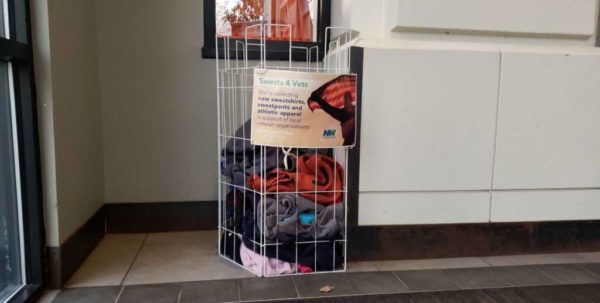
(Updated 4:50 p.m.) As it starts to get colder, some veterans and families around the region don’t have a home to take shelter in.
The Not Your Average Joe’s restaurant in the Reston Town Center is collecting unused, or gently used, sweaters and sweat pants as part of a “Sweats 4 Vets” program.
“We do have a homeless problem in Reston,” said Joe Becker, general manager at Not Your Average Joe’s. “It’s not front page news, but if you look around it’s there.”
Becker said the collection is a partnership with Northwest Federal Credit Union.
“Every fall, going into winter, we collect [sweat-clothes] for veterans,” said Becker. “We have hypothermia shelters in the area that we get these clothes out to.”
The collection is starting to fill up, and Becker’s goal is to have it overflowing. Normally the clothing is collected at the beginning of December, but Becker said the weather made him want to keep collecting for a few more weeks to get more sweat-clothes.
“It’s halfway full, so it’s getting up there,” said Robert DeSilva, a manager at Not Your Average Joe’s. “We prefer new items, but we will take slightly used [sweat-clothes] in all sizes and cuts.”
DeSilva said the collection will continue for two more weeks before the clothing is donated to local shelters.
“There’s plenty of veterans on hard times right now,” DeSilva said. “We need to take care of those who have taken care of us.”
Photo via Not Your Average Joe’s
 Home share, a nationwide housing program, is offered in just 16 states, according to the National Shared Housing Resource Center. The program, which allows individuals to exchange housing for help in the home, is coming to Fairfax County soon.
Home share, a nationwide housing program, is offered in just 16 states, according to the National Shared Housing Resource Center. The program, which allows individuals to exchange housing for help in the home, is coming to Fairfax County soon.
GraceFul Homeshare, a family-owned organization that offers in-home care for seniors and older adults with disabilities, is in the process of establishing a home share program for Herndon and Reston. The organization is currently seeking homeowners interested in participating, tenants and volunteers.
The system allows homeowners to offer accommodation to a homesharer who agreed to provide money and/or help with household tasks in exchange for housing. Advocates say home sharing is an efficient use of existing housing stock, helps preserve the fabric of the neighborhood and lessen the need for care services and long term institutional care.
Examples of homesharers include senior citizens, people with disabilities, working professional and individuals at risk of homelessness.
Interviews and background checks will take place before introductions are arranged. Each part will pay an application fee. If the application is accepted and a match is made, the homework will pay a fee for the service.
For more information about the program, email Dan Flavin at [email protected] for more information. GraceFul serves Fairfax, Loudoun, Prince William and Arlington counties in Virginia, Maryland’s Montgomery County and surrounding areas.
 As temperatures dip and the risk of hypothermia increases, local cold weather and hypothermia prevention programs are coming into full swing.
As temperatures dip and the risk of hypothermia increases, local cold weather and hypothermia prevention programs are coming into full swing.
Beginning this month, all three of Fairfax County’s emergency centers that serve single adults instituted a “no turn-away policy.” Through March 31, the North County Human Services Building on 1850 Cameron Glen Drive will be open to individuals through the hypothermia prevention program.
Additional sleeping space will also be available at the Cornerstones’ Embry Rucker Community Shelter, a 70-bed residential shelter, throughout the winter season. Services include hot dinner, breakfast, bagged lunches, showers, laundry, bus tokens and basic self-care supplies.
On Wednesdays from 3 to 5 p.m., the organization will also provide employment services at the main shelter. The shelter, which opened in 1987, has 42 beds for families, 28 beds for unaccompanied adults and 10 beds for cold weather overflow.
If an unsheltered individual is seen at night who may be at risk of hypothermia, the Fairfax County non-emergency phone line accepts calls at 703-691-2131. Emergency personnel will determine the shelter most suitable for the individual as needed.
For more information, contact Cornerstones at [email protected] or [email protected]
To volunteer or donate, please contact Susan Alger at [email protected].


